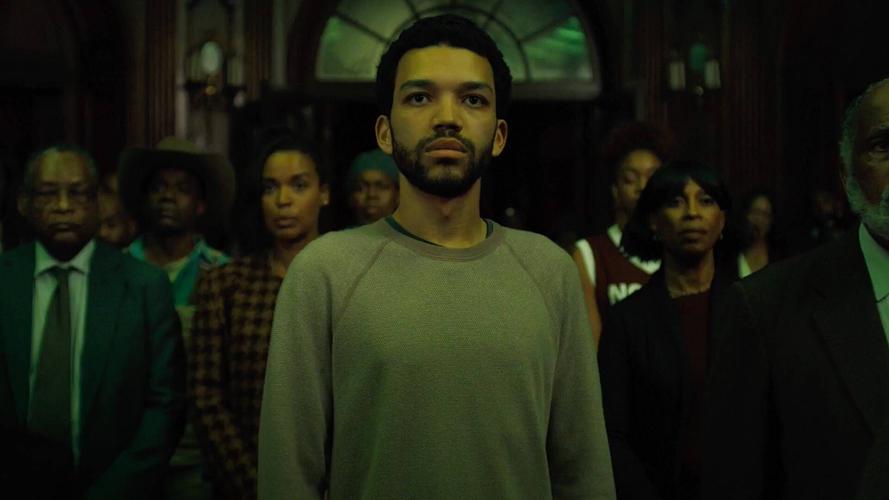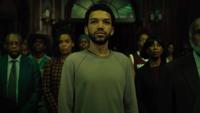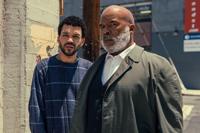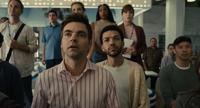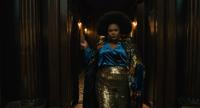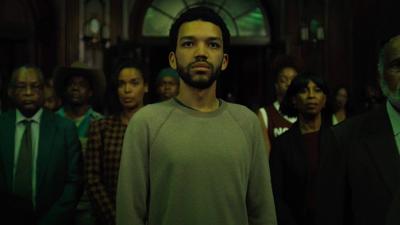For those who know about film criticism and cinema history, you've probably heard of the term "magical negro." Oscar-winning filmmaker Spike Lee coined the term over 20 years ago, identifying a racist trope in Hollywood that went back nearly a hundred years. This film, written and directed by Kobi Libii, in his feature debut as such, is obviously satirizing that trope. At one point, Libii's protagonist sees what are obvious allusions to The Green Mile (1999) and The Legend of Bagger Vance (2000), two of the films that Spike Lee cited as emblematic of the racist trope. It's clear that Libii is trying to address the concerns that Spike Lee raised, but his film misses the mark in terms of its scope and its eye to the bigger picture.
Justice Smith (Jurassic World Dominion and Pokémon: Detective Pikachu) stars as Aren, a 27-year-old artist who does yarn sculptures. He's gotten an exhibit in an art gallery, but he's very neurotic and anxious. He's also not good at standing up for himself. His anxiety is revealed to be a psychical effect of racism. He reveals that basically his anxiety is rooted in his fear of White people. Yet, that reveal doesn't make a lot of sense, given that Aren admits to being biracial and having a White mother with whom he seems to have a good relationship. Nonetheless, Aren is a living embodiment of the magical negro trope minus the magic. Yet, the trope was never about fearing White people, as it was about utter subservience, the "happy slave," as it were. The trope is basically a Black character who only exists to help a White character or be subservient to one, absent any independent life or interests, and always doing so with a smile. It was never really about fear.

David Alan Grier (The Color Purple and Jumanji) co-stars as Roger, a man in his 60's who is working as a bartender at the art gallery on the night of Aren's exhibition. He notices Aren living up to the magical negro trope. Roger notices this because he himself is a literal magical negro and is part of the titular society. Roger doesn't normally recruit new people into the society, but he decides to make Aren a version of himself, meaning he gives Aren magical powers and tells him he has to serve White people. Like in Harry Potter and the Sorcerer's Stone (2001), Aren is taken to a school not unlike Hogwart's, but, instead of a train station, it's through a barber shop. It's at the school where Aren learns to be a magical negro with Roger as his mentor.
Unfortunately, Libii doesn't really explain what exactly the magical powers are or all of the rules for them. We see Roger make things appear and disappear. He can basically teleport people and things. We see others levitate objects. We hear that the only limit is that the magic can't be used selfishly or for self-aggrandizing. Yet, it seems like there's more to the magic than teleportation and levitation. The way it's conveyed, Aren is essentially a genie assigned to a White person trying to grant them wishes or give them what they want, but the White person doesn't know Aren is a genie. Yet, we never see Aren actually using his powers to affect anything for the person to whom he's assigned.

Drew Tarver (The Other Two and Other People) also co-stars as Jason, a developer at a social media company, the White person to whom Aren gets assigned. Jason is sad about something or there's something he wants that he can't get. Aren has to find out what that something is and give it to him. Therefore, the majority of this film is Aren trying to placate or coddle Jason, as he helps him achieve some random goal. Basically, we watch Aren be the trope or stereotype that Spike Lee criticized. However, Aren never really uses his powers to affect anything for Jason. We occasionally see Aren give Jason affirmations, the occasional compliment or advice, but Aren does nothing actually magical for Jason.
Yes, there have been some films that have been criticized as having a "magical negro" in which no actual magic was incorporated. One recent example is Green Book (2018) in which there's no magic but the Black character exists merely to teach the White character about racism, enriching the White character's life, if not the Black character's. Therefore, Libii's film didn't need magic, but Libii is the one that went out of his way to make magic a literal thing in his narrative. To not have Aren use it feels disingenuous. Not having magic could have been a way for Libii to undermine the trope. If this were a true satire, that trope would be undermined and shown to be truly offensive or harmful. However, Libii doesn't do that. He doesn't undermine the trope, not really. Mostly, there are plenty of scenes where Roger argues how this trope is actually saving the lives of Black people, but, in terms of effectiveness, this film fails to demonstrate how Aren's involvement would save any Black person anywhere.

Jason is an office worker at a tech company. It's not as if Jason is a cop or an extremist that would be likely to commit violence at all against Black people. The film never makes the case that Jason is an Incel or a white supremacist. Coding Jason as that might have been Libii's intention but it's not sold at all. Therefore, it's never clear how helping Jason in his life professionally or romantically would specifically lead to saving the lives of Black people. There is a brief scene where we see Roger placate a police officer. Given the references to Black Lives Matter and all the shootings of unarmed Black people, that brief scene makes sense, but then the question arises of why Aren isn't assigned to a cop or people with the power or inclination to do harm to African Americans. It just feels like Aren is wasting his time with Jason, whereas instead he could be affecting more powerful or influential White people.
An-Li Bogan rounds out the cast as Lizzie, a graphic designer at the same tech company as Jason. It's revealed that Jason has a crush on Lizzie and one of his goals is to be in relationship with her. For some reason, he's not capable of asking her out. It takes Aren helping him. The wrinkle is that Aren also has feelings for her. It's weird because Aren is at first awkward around her, but we are to presume that Aren's awkwardness is more charming than Jason's. We're not sure why until it's revealed later that Jason might be too much of a walking example of white male privilege, which Lizzie easily identifies and rebuffs.

After Lizzie is put off by Jason, the film essentially becomes a romantic comedy over whether Aren and Lizzie will be together or if Aren will back off, so that Jason can be with her. Aren has to back off because Roger says that's part of his assignment, to let his White person have what he wants, including the girl. Unfortunately, the film never makes the case that Jason really wants Lizzie to any significant degree. He says it, but there's no explanation as to why or what is it about her that he likes. It's also evident that Lizzie is put off by Jason, so the likelihood that Lizzie would be with Jason is rather moot anyway. Again, it just feels like Aren is wasting his time and that there are no real stakes here.
If this film were simply a romantic comedy without the magical negro aspect, it would've been fine. The scenes between Smith and Bogan are relatively cute and having a rom-com between two people of color is rare. The workplace issues that arise, that of racism and even sexism, are properly placed. Yet, the magical negro aspects only weigh the narrative down. It weighs the narrative because all I could think is instead of worrying about Jason's life, Aren should have more powerful or influential White people as his clients, like politicians to get legislation passed, such as reparations, police reform or voting rights. Aren should be working with bank managers to give Black people loans or credit to start businesses and build wealth. Aren should be working with headhunters to get Black people jobs in more executive or CEO suites, which seemingly would have helped Black people more. Having Jason as Aren's client felt so inconsequential.

Despite the title, the film also gives us so little insight in the so-called society of magical Negroes, Nicole Byer (Grand Crew and Nailed It) plays Dede, the president of the titular society, but the only thing we learn about her is that she loves to levitate. How she became president and if she feels that they're being successful or not would have been more interesting to explore. Racism is raging in red states like Florida with so-called anti-CRT laws. It would have been more interesting if instead of a rom-com, Aren was an agent of chaos, present in the society only to question or challenge it and truly deconstruct it. For example, Aren should have asked why don't all Black people get these powers? Why is it only a select few? Libii doesn't dig deep into this society because I don't think he really cares that much about deconstructing the trope.
Rated for PG-14 for some strong language.
Running Time: 1 hr. and 44 mins.
In theaters.

